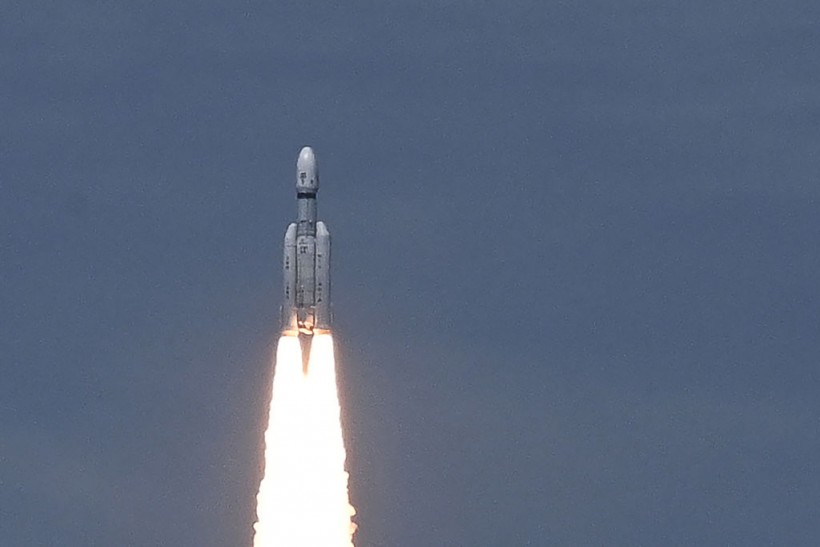On Monday, January 1, India marked a significant milestone in space exploration by launching its first satellite, the X-ray Polarimeter Satellite, dedicated to studying black holes. This endeavor positions India as the second country, following NASA's 2021 mission, to delve into the mysteries of black holes and other celestial phenomena through an astronomical space observatory.
The ambitious project reflects a global effort to expand current understanding of the universe, with NASA's prior mission already yielding groundbreaking discoveries.

An Indian Space Research Organisation (ISRO) rocket carrying the Chandrayaan-3 spacecraft lifts off from the Satish Dhawan Space Centre in Sriharikota, an island off the coast of southern Andhra Pradesh state on July 14, 2023.
India's XpoSat To Study Black Holes
Black holes, colossal concentrations of matter compressed into a minuscule space, emerge from the remnants of massive stars that undergo a supernova explosion. Their gravitational force is so intense that even light cannot escape, rendering them elusive and challenging to detect.
In a significant step towards unraveling these cosmic enigmas, the Indian Space Research Organisation (ISRO) launched the X-ray Polarimeter Satellite (XPoSat) from the Sriharikota spaceport on Monday at 09:10 local time (03:40 GMT).
This mission is integral to India's broader space aspirations, which extend beyond black hole exploration. Among its goals is the dispatch of three astronauts into low-Earth orbit, with a planned return after three days.
If successful, India would join the exclusive group of countries capable of manned space missions, currently comprising Russia, the United States, and China. ISRO's chairperson, S. Somanath, emphasized that 2024 is a pivotal year for the Gaganyaan project, indicating readiness for manned launches.
The XPoSat satellite, designed to investigate black holes, comes with a price tag of approximately 250 million rupees ($30 million; £23.5 million) and boasts an estimated lifespan of five years. This ambitious venture marks India's concerted effort to advance its space capabilities and contribute significantly to the understanding of celestial phenomena, particularly the enigmatic nature of black holes.
ISRO's Year of Space Missions
ISRO's triumphs, including Chandrayaan 3 and the inaugural solar mission Aditya L1, signal an ambitious 2024 for India. As the country embarks on diverse space explorations, the organization's commitment to innovation and collaboration promises groundbreaking advancements.
The recent launch adds to ISRO's stellar year, with plans for further missions in 2024, including Gaganyaan, ISRO aims for a manned mission by 2025, solidifying its dedication to pushing the boundaries of space capabilities.
ISRO's 2024 space missions promise groundbreaking advancements across diverse domains, starting with the NASA-ISRO Synthetic Aperture Radar (NISAR), launching in January.
The mission aims to revolutionize global remote sensing by providing invaluable data on Earth's ecosystems, ice mass, and natural hazards. Another critical launch is the INSAT-3DS, set for January, enhancing India's weather monitoring and disaster management capabilities.
India is preparing for the collaborative Gaganyaan 1 mission, which will see ISRO and Hindustan Aeronautics Ltd (HAL) conducting a test flight with three crew members, representing a notable advancement in India's Human Spaceflight Programme.
Furthermore, ISRO's ambitious Mangalyaan-2, the X-ray Polarimeter Satellite, and Shukrayaan-1 missions will explore Mars, investigate cosmic X-rays, and study Venus, respectively. These missions underscore India's expanding prowess in planetary exploration and scientific research.
The increase in private involvement, with 523 startups and companies working with IN-SPACe, ISRO's commercial arm, marks a new era of collaboration and innovation. This partnership is boosting India's space exploration capabilities, showing a shared commitment to advancing scientific knowledge.
RELATED ARTICLE: NASA Collaborates With ISRO on Groundbreaking Earth-Observing Mission With NISAR Satellite Launching in 2024
Check out more news and information on Space in Science Times.














